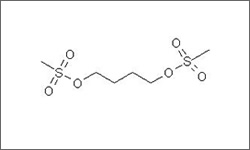Busulfan

Busulfan (Myleran®) is an alkylating agent that prevents DNA synthesis and transcription and induces (causes) nucleotide mutations through alterations of all cell cycle phases.1
The diagram above shows the 3D molecular structure of Busulfan.
- 1 Chu, E., & DeVita, V. T. (2015). Physicians' cancer chemotherapy drug manual 2015. Burlington, MA: Jones & Bartlett Learning.
The most common adverse effect of busulfan is bone marrow depression which results in altered blood cell counts. For this reason, cell counts are monitored frequently to avoid any more serious effects. Other common side effects include: nausea, vomiting and diarrhea.1
- 1 Chu, E., & DeVita, V. T. (2015). Physicians' cancer chemotherapy drug manual 2015. Burlington, MA: Jones & Bartlett Learning.
Busulfan should not be taken by women who are pregnant and patients should not become pregnant while using this drug, as it may have harmful affects on the developing fetus. Busulfan can cause interstitial pneumonitis, as such patients should be monitored for pulmonary issues.1
- 1 Chu, E., & DeVita, V. T. (2015). Physicians' cancer chemotherapy drug manual 2015. Burlington, MA: Jones & Bartlett Learning.
